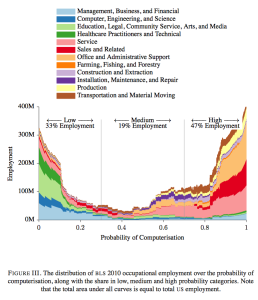Peter Lobner
In September 2013, University of Oxford researchers Carl Benedikt Frey and Michael Osborne published a paper entitled, “The Future of Employment: How Susceptible are Jobs to Computerization?”. In this paper, they estimated that 47% of total U.S. jobs have a high probability of being automated and replaced by computers by 2033. Their key results are summarized in the following graphic.
You can download their paper for free at the following link:
On 5 Feb 2015, Fortune published an article entitled, “5 white-collar jobs robots already have taken.” This article identifies the affected jobs as:
- Financial and sports reporters
- Online marketers
- Anesthesiologists, surgeons, and diagnosticians
- E-discovery lawyers and law firm associates
- Financial analysts and advisors
You can read the complete article at the following link:
http://fortune.com/2015/02/25/5-jobs-that-robots-already-are-taking/
On 21 May 2015, NPR posted an interesting interactive article that provides rough estimates of the likelihood that particular jobs will become automated in the future. The ranking is based on the following factors:
- Do you need to come up with clever solutions?
- Are you required to personally help others?
- Does your job require you to squeeze into small spaces?
- Does your job require negotiation?
You can try out this interactive site at the following link:
There is no opportunity to select many technical professions in science or engineering. Nonetheless, the results for the jobs you can select are insightful. Here are a few example screenshots from the above NPR link:
Choosing a career is always a complicated process, but these recent studies clearly show that some careers will be marginalized by automation in the relatively near future.



